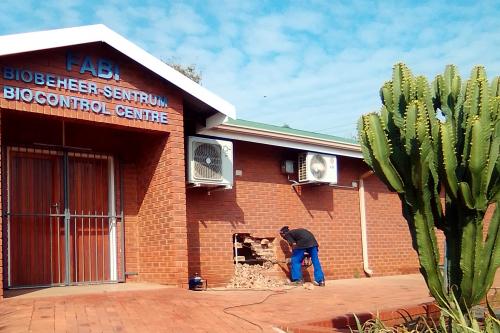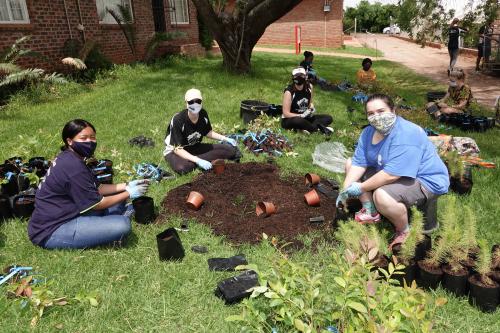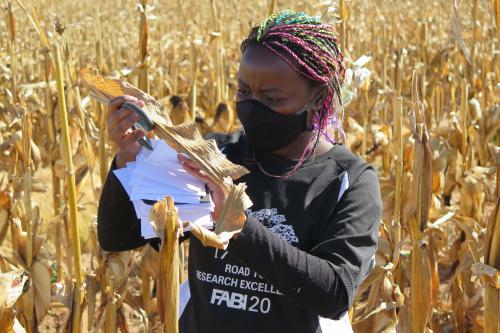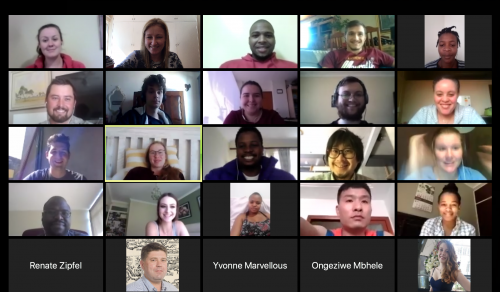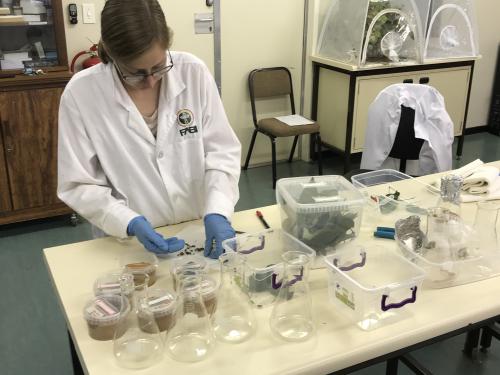Mr Matthew Jackson

| Technical Research Assistant | |
Department |
|
FABI |
|
| Full CV | |
| This email address is being protected from spambots. You need JavaScript enabled to view it. | |
Member of:
My Files
My Links
My BScHons at Rhodes University:
I obtained a BSc in Microbiology and Biochemistry in 2017 at Rhodes University. In 2018, I also completed a BScHons in Biotechnology at Rhodes University. My Honours project involved optimising a multiplex PCR assay for use in the detection of two baculoviruses, Cryptophlebia leucotreta granulovirus and Cryptophlebia peltastica nucleopolyhedrovirus, which are being used for the control of the False Codling Moth, Thaumatotibia leucotreta - a huge pest to the South African citrus industry. From this research, I developed a prototype for a testing kit, which can be used to detect these baculoviruses in the field and within rearing facilities. My honours project inspired me to continue pursuing my studies in agricultural biotechnology.
My MSc at FABI:
I completed my MSc. in Genetics at FABI. My research focuses on the population genetics of the Fall Armyworm, Spodoptera frugiperda - a polyphagous pest native to the Americas, which has recently invaded Africa. I used microsatellite markers to understand the genetic variation and population structure of the Fall Armyworm in Africa.
Currently, in South Africa, the Fall Armyworm is being controlled by the use of genetically-modified crops. Although resistance by the Fall Armyworm towards GM crops has yet to be identified in South Africa, it may only be a matter of time before this occurs. If deleterious resistance alleles are to arrive in South Africa from the Americas, or if they are to develop through mutation, it is important to understand which regions these traits could spread to, and how rapidly they may spread through populations.
Population genetics could provide insight into the ecological and evolutionary processes of the Fall Armyworm, such as its migratory patterns and mutations, as well as sites of introduction. If this is understood, the necessary control strategies can be implemented to minimise the spread of resistance alleles.
As part of this project, I also used CRISPR/Cas9 to target specific genes involved in pigmentation and segment formation within S. frugiperda in order to help establish the technology at FABI. Gene-editing of these easily-identifiable phenotypic traits would allow for easier identification of successful alteration. Establishing this technology forms the basis from which we can target other genes in the Fall Armyworm using CRISPR/Cas9. For instance, genes involved in resistance against genetically modified crops could be targeted as part of a control strategy against this pest. We will also be developing a rapid identification protocol for Spodoptera frugiperda, using CRISPR/Cas which will streamline time-consuming identification methods.
I worked under the supervision of Prof. Bernard Slippers and the co-supervision of Prof. Brett Hurley and Prof. Kerstin Krüger.
The Grain Research Programme (GRP):
I am currently working as a research assistant for the Grain Research Programme (GRP) at FABI. This programme encompasses a group of grain researchers from numerous disciplines and institutes across the country. My work focuses on the monitoring and management of important maize Lepidopteran pests including the African maize stalk borer (Busseola fusca), the Fall Armyworm (Spodoptera frugiperda) and the Spotted Stem Borer (Chilo partellus). As part of this, I conduct various research trips across South Africa, where we collect these species from maize farms and sentinel plots which we have established in key locations. The collected populations are then established as rearing colonies at the FABI Biocontrol Centre, where we are conducting Bt resistance screening trials on these pests.
Publications
Gui F, Lan T, Zhao Y, Guo W, Dong Y, Fang D, Liu H, Li H, Wang H, Hao R, Cheng X, Li Y, Yang P, Sahu SK, Chen Y, Cheng L, He S, Liu P, Fan G, Lu H, Hu G, Dong W, Chen B, Jiang Y, Zhang Y, Xu H, Lin F, Slippers B, Postma A, Jackson M, Abate BA, Tesfaye K, Demie AL, Bayeleygne MD, Degefu DT, Chen F, Kuria PK, Kinyua ZM, Liu TX, Yang H, Huang F, Liu X, Sheng J, Kang L. Genomic and transcriptomic analysis unveils population evolution and development of pesticide resistance in fall armyworm Spodoptera frugiperda. Protein Cell. 2022 Jul;13(7):513-531. doi: 10.1007/s13238-020-00795-7. Epub 2020 Oct 27. PMID: 33108584; PMCID: PMC9226219.
My Galeries
News
Construction of an artificial diet room has started at the FABI Biocontrol Centre at Innovation Africa.
Forty FABIans from the Tree Protection Co-operative Programme (TPCP) and Grain Research programme (GRP) got their hands dirty replanting 200 pine and 1500 Eucalyptus seedlings into potting bags at the last tree planting event for 2020 on 27 November. This year’s tree planting also included students from the GRP who harvested maize leaves.
FABI launched its multidisciplinary Grain Research Programme (GRP) during an online event on 21 August.
The DNA Sanger Sequencing facility at the University of Pretoria (UP) hosted an annual in-house Introductory Microsatellite Workshop (IMW) for UP postgraduate students and staff from 4-11 May 2020.
FABI runs numerous Journal Clubs. Importantly these have continued to meet during the COVID-19 lockdown, albeit using virtual platforms.
At the FABI Biocontrol Centre on the experimental farm of the university, several living collections of organisms are being maintained, particularly for the TPCP Biocontrol research.



